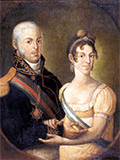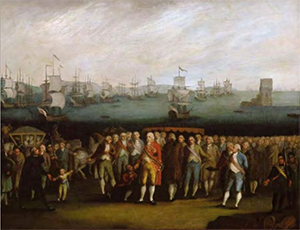King John VI of Portugal
John VI was King of Portugal in his own right for only a decade in the 19th Century but is known more for fighting against France and Spain during his regency before that and for shepherding Brazil into the modern era while fighting to keep his throne at home. He was born on May 13, 1767, in Queluz Palace. His mother was the eventual Queen Maria I, and his father was her husband, King Consort Peter III. The monarch when John was born was his grandfather, Joseph I. 
John was his parents' secondborn son; the first, José, died in 1788. Three years before that, John had married Carlota Joaquina of Spain, whose father would become Spain's King Charles IV. At the time that John and Carlota were married, she was only 10. They eventually had nine children, eight of whom survived into adulthood: Maria Teresa (1793), Maria Isabel (1797), Peter (1798), Maria Francisca (1800), Isabel Maria (1801), Miguel (1802), Maria da Assunção (1805), and Ana de Jesus Maria (1806). Maria suffered from ever worsening mental difficulties and, in 1792, relinquished the reins of government to John, who by then was 23. He did not formally become regent until 1799. 
Falling back on his country's historical alliance with Great Britain (by then the United Kingdom), John declared Portugal in opposition to revolutionary France. A joint French-Spanish force invaded Portugal in 1801 and soundly defeated the defenders; John found himself forced to agree to the humiliating terms of the Treaty of Badajoz and follow the lead of France's Napoleon Bonaparte. France eventually targeted the U.K. through Portugal and invaded in 1807. John and the rest of the royal family fled to Brazil, where they stayed even after Bonaparte's final defeat, in 1815. John offered full military support to U.K. forces under the later Duke of Wellington, who arrived in Portugal in 1808 and eventually liberated not only that country but also Spain. Maria died 1816, and John became King John VI. As was happening in several places in the early 19th Century, Portugal was the setting for a revolution. The absolutist monarchy days of previous rulers were certainly gone by then, but the people wanted more of a say in their government and so ousted John as a monarch and designated him a constitutional monarch. The Cortes won from John a promise to abide by the country's first constitution. He had waited for all of those goings-on to play out before returning, in 1821. Part of the agreement brokered between the king and the leaders of the new constitutional government was that Brazil be declared separate. John's oldest son, Pedro, was still there and, promising to retain control, instead led a revolt that brought with it a declaration of independence, in 1822, and the declaration of Pedro as Emperor of Brazil. 
That was the first of several intrigues against John's newly defined rule. Queen Carlota did not approve of her husband's giving up power and supported a movement to restore absolutism; as a result, the new government stripped the queen of her royal power and title. The former queen threw her influence behind her younger, son Miguel, who was commander of the army and had some support among those who wanted to void the new constitution. John attempted to generate a peaceful transfer of power, but Miguel wanted to rule in his own stead, unconstrained by the Cortes, and so mother and son battled on. Miguel led a revolt in 1824 that captured John; however, his captors released him and John ultimately prevailed, engendering enough support to send Miguel into exile and the queen into house arrest. After a three-year war of independence, John and the government recognized Brazilian independence in 1825. Pedro remained as emperor there. John VI died on March 10, 1826, in Lisbon. Later examination of his body found arsenic in his system, enough to kill two people. Suspicions that he was poisoned continued for some time. He had been ill for his last few days, during which time he designated his daughter Maria Isabel as regent. When he died, his son, the designated heir, succeeded him as King Pedro IV. As King of Portugal, John VI is known primarily for the continuing threats against his rule. As ruler of Brazil, he is known for establishing a wide variety of institutions, including a gunpowder factory, a botanical garden, a publishing house, institutes of medicine and other sciences, a handful of other educational programs, the Royal Museum, the National Library, and the royal theater.
|
|
Social Studies for Kids
copyright 2002–2026
David White




